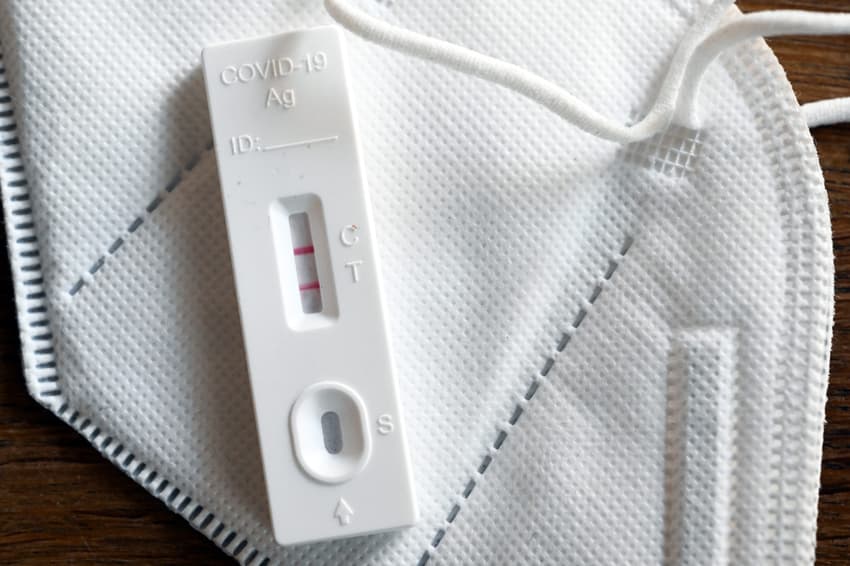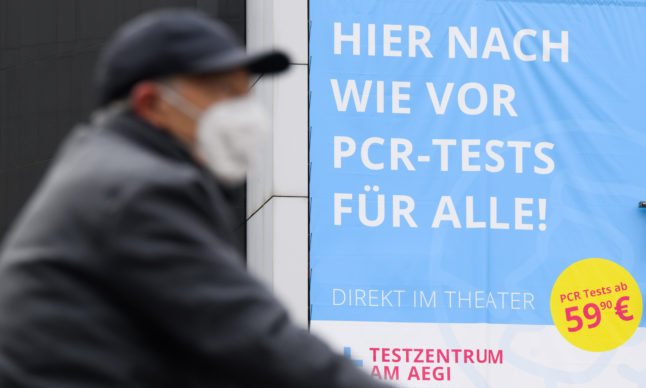EXPLAINED: What to do if you test positive for Covid in Germany

Two years after the Covid pandemic started in Germany, responding to a positive test result should be a simple enough thing. But a lot of people are unsure what to do after seeing those two dreaded red lines on their rapid test. Here's what you need to know.
The Covid infection rate in Germany has been soaring to record levels recently, with more than 300,000 positive test results recorded by the Robert Koch Institute (RKI) on some days. Just a week or so ago, the country broke 1.5 million weekly new infections for the first time since the start of the pandemic.
Since not everyone who gets Covid reports the infection, these numbers are believed to be an understatement. In short: the odds of getting Covid in Germany have never been higher.
So, what should you do if you take a rapid test and find out the result is positive? Is it best to self-isolate straight away, or should you try and seek out other tests just to be sure?
Here are the latest guidelines and rules to know about.
What to do after testing positive for Covid
If you've taken a test at home and got a positive result, your first port of call should be your GP.
Since doctors' practices are trying to reduce contact to a minimum during the pandemic, many surgeries offer special walk-ins for people who may have Covid, though the easiest thing to do is to simply give them a call and ask for some advice.
If you don't have a GP or they aren't available when you need to talk to them, you can call the Covid hotline on 116 117. You can call this hotline even if you're not a resident in Germany, for instance if you're a visitor, and they will be able to advise you on the next steps.
In any case, you'll likely be expected to self-isolate or confirm your result with a further supervised test. If you've been in close contact with friends and family in recent days, it's also a good idea to let them know so that they can get tested themselves.
Also keep in the mind that the taxpayer-funded Schnelltest stations and centres in Germany offering at least one weekly free Covid-19 test per week are also available to visitors.
How long should I self-isolate for?
People who've tested positive for Covid-19 should self-isolate at home for at least seven days. If you no longer have symptoms on the seventh day, you can end your quarantine with a negative rapid test from a certified testing centre.
If you test positive, you can try again on the eighth and ninth day, and on the tenth day, you're free to start socialising again without needing a further test.
Obviously, if you're unlucky enough to still have symptoms, it's best to stay home to avoid spreading the virus to other people. This isn't however required by law.
Do I have to report the infection to the authorities?
Generally, no, though the rules on this do differ slightly from state to state. In Berlin, for instance, you're required to get a follow-up antigen test at a certified testing centre following a positive result with a home testing kit. If this test is positive, you can then get a PCR.
In Lower Saxony and Bavaria, there's no need for a second rapid test and you will be able to arrange a PCR test right away.
Even if you're not obliged to register an infection, it can be incredibly useful to do so as it helps the experts get an accurate picture of the number of infections there have been.
This helps politicians and advisors work out how much of the population has a base level of immunity, which in turns helps them decide how many of the Covid measures can be scrapped without risking an overload of the health service.
READ ALSO:
- EXPLAINED: The streamlined Covid measures coming in force in Germany
- How long will Germany offer free rapid Covid-19 tests?
When am I entitled to a PCR test?
According to the Ministry of Health, anyone with a positive antigen test result can get a free PCR test at a state testing centre. This includes both home tests and supervised Bürgertests.
However, they also say that, with the current high incidences, it's not always necessary to get one.

A sign advertises PCR tests in Hannover. Photo: picture alliance/dpa | Julian Stratenschulte
When making a decision, bear in mind that it can be useful to have a positive PCR in order to prove your recovery status at a later date.
Mecklenburg Western-Pomerania and Hamburg are keeping their 2G and 3G rules in place for another three weeks or so - and other states may bring them back - so it can be good to have this proof if you aren't vaccinated.
It can also be very useful to have proof of recovery for EU-wide travel in spring and summer.
Is Germany going to ease its quarantine rules soon?
This is the million-euro question! As you will have noticed, Germany's been in the process of easing up all sorts of Covid restrictions lately, from masks in shops to travel rules.
At a recent press conference, Berlin Mayor Franziska Giffey (SPD) also hinted that a relaxation of quarantine rules may soon be on the cards.
However, nothing has been confirmed yet, so be sure to follow the current rules for now and we'll keep you updated.
For a full run-down of quarantine and self-isolation rules, check out the explainer below:
EXPLAINED: Germany’s rules and exceptions for Covid quarantine
Comments
See Also
The Covid infection rate in Germany has been soaring to record levels recently, with more than 300,000 positive test results recorded by the Robert Koch Institute (RKI) on some days. Just a week or so ago, the country broke 1.5 million weekly new infections for the first time since the start of the pandemic.
Since not everyone who gets Covid reports the infection, these numbers are believed to be an understatement. In short: the odds of getting Covid in Germany have never been higher.
So, what should you do if you take a rapid test and find out the result is positive? Is it best to self-isolate straight away, or should you try and seek out other tests just to be sure?
Here are the latest guidelines and rules to know about.
What to do after testing positive for Covid
If you've taken a test at home and got a positive result, your first port of call should be your GP.
Since doctors' practices are trying to reduce contact to a minimum during the pandemic, many surgeries offer special walk-ins for people who may have Covid, though the easiest thing to do is to simply give them a call and ask for some advice.
If you don't have a GP or they aren't available when you need to talk to them, you can call the Covid hotline on 116 117. You can call this hotline even if you're not a resident in Germany, for instance if you're a visitor, and they will be able to advise you on the next steps.
In any case, you'll likely be expected to self-isolate or confirm your result with a further supervised test. If you've been in close contact with friends and family in recent days, it's also a good idea to let them know so that they can get tested themselves.
Also keep in the mind that the taxpayer-funded Schnelltest stations and centres in Germany offering at least one weekly free Covid-19 test per week are also available to visitors.
How long should I self-isolate for?
People who've tested positive for Covid-19 should self-isolate at home for at least seven days. If you no longer have symptoms on the seventh day, you can end your quarantine with a negative rapid test from a certified testing centre.
If you test positive, you can try again on the eighth and ninth day, and on the tenth day, you're free to start socialising again without needing a further test.
Obviously, if you're unlucky enough to still have symptoms, it's best to stay home to avoid spreading the virus to other people. This isn't however required by law.
Do I have to report the infection to the authorities?
Generally, no, though the rules on this do differ slightly from state to state. In Berlin, for instance, you're required to get a follow-up antigen test at a certified testing centre following a positive result with a home testing kit. If this test is positive, you can then get a PCR.
In Lower Saxony and Bavaria, there's no need for a second rapid test and you will be able to arrange a PCR test right away.
Even if you're not obliged to register an infection, it can be incredibly useful to do so as it helps the experts get an accurate picture of the number of infections there have been.
This helps politicians and advisors work out how much of the population has a base level of immunity, which in turns helps them decide how many of the Covid measures can be scrapped without risking an overload of the health service.
READ ALSO:
- EXPLAINED: The streamlined Covid measures coming in force in Germany
- How long will Germany offer free rapid Covid-19 tests?
When am I entitled to a PCR test?
According to the Ministry of Health, anyone with a positive antigen test result can get a free PCR test at a state testing centre. This includes both home tests and supervised Bürgertests.
However, they also say that, with the current high incidences, it's not always necessary to get one.

When making a decision, bear in mind that it can be useful to have a positive PCR in order to prove your recovery status at a later date.
Mecklenburg Western-Pomerania and Hamburg are keeping their 2G and 3G rules in place for another three weeks or so - and other states may bring them back - so it can be good to have this proof if you aren't vaccinated.
It can also be very useful to have proof of recovery for EU-wide travel in spring and summer.
Is Germany going to ease its quarantine rules soon?
This is the million-euro question! As you will have noticed, Germany's been in the process of easing up all sorts of Covid restrictions lately, from masks in shops to travel rules.
At a recent press conference, Berlin Mayor Franziska Giffey (SPD) also hinted that a relaxation of quarantine rules may soon be on the cards.
However, nothing has been confirmed yet, so be sure to follow the current rules for now and we'll keep you updated.
For a full run-down of quarantine and self-isolation rules, check out the explainer below:
EXPLAINED: Germany’s rules and exceptions for Covid quarantine
Join the conversation in our comments section below. Share your own views and experience and if you have a question or suggestion for our journalists then email us at [email protected].
Please keep comments civil, constructive and on topic – and make sure to read our terms of use before getting involved.
Please log in here to leave a comment.